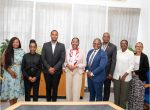Readily committed to ramping up its renewable energy output, Namibia is on the brink of energy transformation. InnoSun – one of the first movers in the market – is aiming to surpass the country’s goal of achieving a 70% renewable energy mix by 2030 through the establishment of utility-scale solar PV and wind power plants.
In a recent interview, Executive Director Usuta Imbili said the development of renewable energy, particularly solar and wind, will enable our country to reduce dependence on imports from neighboring nations, fostering greater energy independence.
“We perceive this industry as rapidly expanding, and we hope to actively participate in and contribute to the growth of the renewable energy sector in Namibia. Our ultimate objective is to surpass the 70% renewable energy target by 2030. The existing incentives and investment environment in Namibia are positive and in place, particularly with substantial support from our own government. We hope for greater liberalization of the entire sector, enabling IPPs and the private sector to assume the risks associated with investing in renewable energy,” Imbili said.
She went on to highlight that from the outset, Innosun’s focus has always been on large-scale or utility-scale PV parks and wind farms.
“We prioritize innovation and strive to stay up-to-date with technological advancements worldwide. Another strategic objective we are pursuing is to assist the government in rural electrification efforts. We are eager to participate in this, as we believe that it’s essential for national development and for providing rural communities with access to healthcare, safety, communication and international connectivity. The government already has policies and programs in place to extend electrification to rural areas,” she said.
According to the latest consensus, there are around 230,000 rural households in Namibia, but only 20% of rural areas have access to electricity. Therefore, there is a considerable deficit that needs to be addressed.
“InnoSun recognizes the importance of energy storage. It not only facilitates technology and knowledge transfer to Namibians, but also enables the development and growth of domestic manufacturing capabilities. It will also help us reduce lead times for delivering components and equipment to those in need within the country. Currently, our heavy reliance on imports means that we are lacking a robust domestic manufacturing base. Establishing our own manufacturing capacity would not only enhance self-sufficiency, but also reduce the costs associated with importing such components into the country,” explained Imbili.
She also explained that battery storage infrastructure is crucial, but it’s not as advanced yet in Namibia.
“Additionally, there is a need for a grid system that is compatible with the integration of solar and other types of energy generation, including conventional sources. This integration can be achieved through a smart grid that enables efficient management and allows for the storage of excess energy, such as hydro pump storage.
“We advocate for demand-side management, where utilities or municipalities can incentivize customers to reduce energy consumption or adopt energy-efficient practices, such as using energy-efficient light bulbs or adopting more efficient cooking methods. By implementing demand-side management, it’s possible to simultaneously increase energy production while reducing overall consumption,” she concluded.
Business Express/ECP










